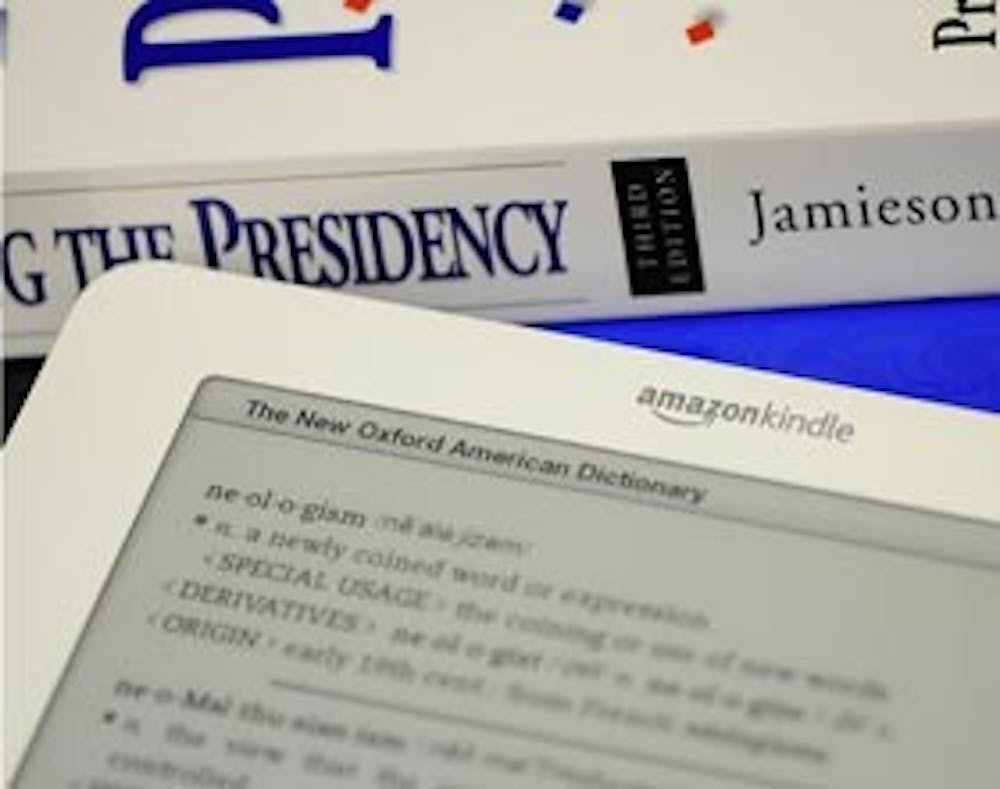According to the National Association of College Stores 2008 report, the average student spent $702 on textbooks in the 2006-2007 academic year.
And textbook prices continue to climb each year, leaving students challenged to find the most cost-effective options for purchasing their required books in the midst of a tough economic climate.
This year, students will encounter new alternatives such as electronic and rental books to help alleviate the pressure on their wallets, but in general, students simply want cheaper books.
"I think that students are definitely more cost-conscious about the price of textbooks," Business Services associate vice president Chris Bradie said, pointing out a trend at the Penn Bookstore of students shying away from buying recommended books in addition to their required titles. "Students are making choices about whether they're buying those titles and when," he said.
Students frequently search out used books to save money - and, in light of the economy, Bradie has observed that interest in used material is increasing.
In response to student lament about the lack of used books at the Penn Bookstore, Bradie assured that "each year, we're trying to push that number upward and increase inventory."
To some students, however, the process of selling and buying used books is not all that easy. "The process at Penn right now is very disorganized," said College senior Alexandra Berger, chairwoman of the Student Committee on Undergraduate Education.
Engineering sophomore Benjamin Shyong agreed that methods for book transactions are all "very independent," from using online sellers like Amazon and Better Than The Bookstore to exchanging books among friends. "There isn't an organized way to get cheap books," he said.
In hopes of easing that process, companies like BIGWORDS.com are offering resources to help students save time while saving money.
BIGWORDS CEO Jeff Sherwood introduced a tool in 2001 called Multi-Item Price Optimization, which organizes all purchasing options into the cheapest combination of stores by factoring in promotions, coupons and various shipping options. The company also released a free iPhone application for students, released on Aug. 1.
Since its creation, Sherwood said, the site has seen the number of visitors grow by 50 percent each year, adding up to about 1 million customers who on average have saved $225 on their multi-item orders.
An alternative to selling and buying used books is renting them from the publisher.
In response to student interest, Cengage Learning plans to launch a textbook rental program this December. It will offer textbooks for 40 to 70 percent below suggested retail price, and the company claims to be the first higher education publisher to offer this service directly to students.
According to Lindsay Brown, director of corporate communications, students can rent titles for the length of the summer, a quarter or semester. Once the rental term is complete, they can either ship the book back or purchase it.
Shyong said that he would find a rental system helpful, suggesting a student-run rental system contained within Penn students.
Berger said in theory renting is a good idea, but in practice there are complications like getting the latest edition of a book, which is important in subjects like the sciences.
Bradie added that for a rental program to work at Penn, "faculty members on the whole would have to agree to lock in on the book for an extended period."
A relative newcomer to the textbook scene, the electronic reader solves some issues associated with the used and rental markets, such as needing updated versions, and has environmental benefits as well.
Seven universities will be working with Amazon this fall to determine the feasibility of using the Kindle DX reader academically, Mace Mentch of Instructional Technology and Academic Computing at Case Western Reserve University wrote in an e-mail.
Case Western will be distributing Kindles to 42 randomly selected freshmen in an introductory chemistry class, with preliminary results expected to be in by this December.
Princeton University is another of the seven, citing environmental sustainability through reducing photocopy and printing as a main reason for the pilot study on its E-reader Pilot Program website.
Penn currently has no plans to adopt an electronic book program, Bradie said.
Though this kind of shift into electronic textbook offers is highly anticipated, he said, in the end, many students still prefer print texts.
He cited as an example that the Penn Bookstore offers digital textbooks at about 40 percent off the price of a new book, but out of the 56 available titles last semester, only 13 were ever purchased.
Regardless, he stressed that faculty members are "embracing" all types of formats, as long as students feel comfortable using them.
"It's really about making sure the content is right," he said.



